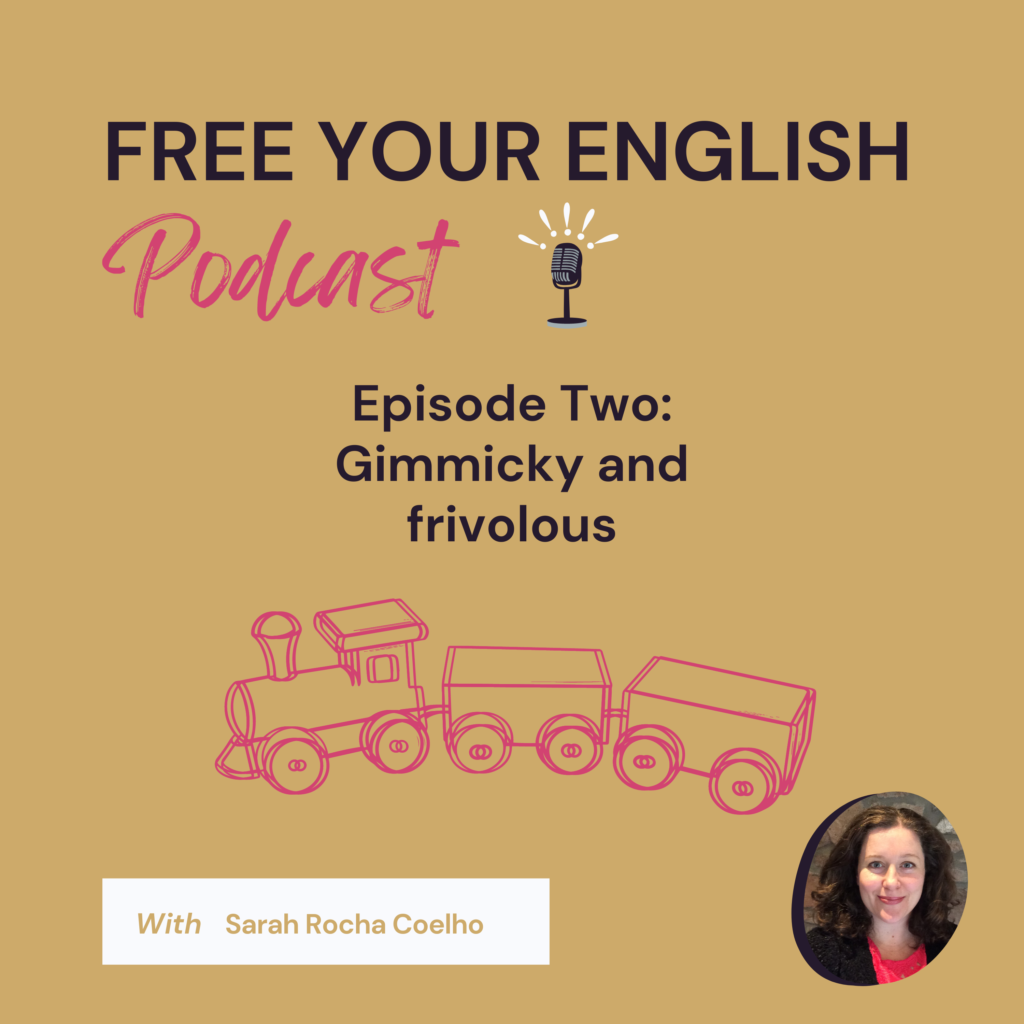Join me for episode two as I look at the collocations and usage of two adjectives: gimmicky and frivolous. I’ll also give you two speaking prompts, my example answers, a very short vocabulary quiz and of course the transcript of the episode.

Listen here:
Podcast transcipt:
Hello and welcome to Episode Two of the Free Your English podcast where I help you improve your English speaking skills by discussing interesting and informative topics and then offering suggestions for how you can practice speaking about them.
My name is Sarah and I’m an English teacher and Communication Coach with over 23 years of experience helping people up-level their English fluency.
If you haven’t listened to Episode One, I suggest you do that first as in the previous episode, I read an article about unconventional types of yoga, including Goat Yoga and Laughter Yoga. Today, we will be doing a deep dive on two of the vocabulary words used in the article.
The first word we will focus on is “gimmicky.” This is an adjective used to describe something that is intended to attract attention but is not really effective or useful. In the article, some people refer to Goat Yoga and Laughter Yoga as gimmicky.
As you know, to help you sound more like a native speaker, it’s really important to focus on using collocations (I.e. words that commonly go together) as you work on improving your active vocabulary so let’s quickly go through some collocations and example usages for the word “gimmicky.”
Gimmicky marketing: The company’s latest advertising campaign is full of gimmicky marketing that fails to highlight the actual benefits of the product.
Gimmicky features: The new smartphone has a lot of gimmicky features that are not really necessary, but are meant to attract buyers.
Gimmicky product: The store is full of gimmicky products that promise quick fixes to common problems but often fail to deliver on their promises.
Gimmicky trend: Some people consider social media challenges to be just a gimmicky trend, without any real value or meaning.
Okay, here’s a speaking prompt for you to practice with. After you’ve heard it, Pause the podcast and give it a go!
“Think of something gimmicky that you’ve seen or experienced before. Can you describe the situation and explain why you thought it was gimmicky? How did you feel about it?”
Here’s a quick example from me:
One time, when I was about ten, I went to this gimmicky restaurant that had a small toy train that went around a track on the walls of the restaurant. They also had decorations of trains all over the walls and servers dressed up in different character costumes. I remember it as being definitely a unique dining experience, but I have to admit, the food was not great even though the restaurant was packed – as in very full. I think the restaurant relied too much on its train gimmick and not enough on the quality of the food and that’s saying something because I am no foodie (I.e. someone who loves gourmet food) so it takes a lot for me to notice if the food is lacking in flavour – basically bland. A real downside of the whole train gimmick that the restaurant had going on was that it was super distracting. I focused so much on the train – where it was going and when it was coming back – that I barely spoke with my family! Despite that, overall it was still a fun and memorable experience and one that I’ve not forgotten. If the restaurant was still open, I would probably still recommend it to people despite it being really gimmicky.
Let’s move on to another word used in the article I read on the last podcast episode which is “frivolous”. This is another adjective that means something that is not serious or important.
Here are some common collocations:
Frivolous spending: Spending money in a careless or unnecessary way. Example: She is always in debt because of her frivolous spending on clothes and accessories.
Frivolous lawsuits: Legal cases that are filed for petty or trivial reasons. Example: The court dismissed the frivolous lawsuit about the spilt coffee.
Frivolous activities: Activities that are considered to be of little value or importance. Example: Many people dismiss video games as frivolous activities that waste time.
Here’s a speaking prompt for you to practice with. After you’ve heard it, Pause the podcast and give it a go!
“Think about a hobby or activity that you enjoy doing but that others might consider frivolous. Why do you enjoy it? Do you think it’s important to have hobbies and activities that are purely frivolous?”
I’ll give you a quick example from my life:
One frivolous activity that I enjoy doing is watching TV shows about baking with my husband and little boy. This is a past time that many people in the U.K enjoy. The Great British Bake Off (often referred to as just “Bake Off”) is a really popular British programme in which amateur bakers compete against each other to be crowned the best baker. It’s a fun show to watch but it’s not exactly profound. It’s not solving any of humanity’s deep problems or providing a great educational experience for my son. Still, sometimes, it’s nice to just relax and watch an episode of a show that we are all interested in as a family and finding a show that suits everyone is quite tricky. As a family, we definitely do less frivolous activities like… actually baking together rather than just watching other people baking! Still, you can’t beat an episode of British Bake Off for pure frivolous fun.
We are coming to the end of this episode but before we go, I’d like to offer you a short multiple-choice vocabulary quiz based on the two words we’ve looked at and some other words I’ve mentioned throughout this episode. The quiz will ask you to choose which is the best synonym. (A synonym is a word that means almost the same as another word. For example, warm is a synonym of hot.)
Here we go!
1. Which word is a synonym for “frivolous”? a. Serious b. Meaningful c. Trivial d. Significant
Answer: c. Trivial
2. Which word is a synonym for “gimmicky”? A) Tacky B) Subtle C) Classic D) Elegant
Answer: A) Tacky
“Tacky” and “gimmicky” are often used interchangeably to describe something that is showy or flashy, but lacking in taste or style.
3. Which word is a synonym for “foodie”? a. Food connoisseur b. Picky eater c. Chef d. Nutritionist
Answer: a. Food connoisseur (Just don’t ask me to spell that correctly. I struggle with spelling French loan words!) A picky eater, in case you didn’t know, is someone who is very fussy and particular about the food they eat but will only eat a few things. They don’t like to try lots of different food.
4. Which word is a synonym for “bland”? a. Spicy b. Flavourful c. Tasteless d. Interesting
Answer: c. Tasteless.
That wraps up Episode Two. Please do try to speak aloud your response to the speaking prompts in today’s episode. Those little bits of speaking practice all add up.
If you are looking for help with how to find a great English speaking partner, you might like to check out my free guide that helps you do exactly that. You can go to www.freeyourenglish.com or see the show notes for the direct link.
Lastly, I have provided a transcript of this episode for you! It is really good pronunciation help to listen to the podcast at the same time as reading the transcript. Check out the show notes for the link for that.
Thanks so much for listening!
Correction:
Did you spot my error?
In question four, I said: “Which food is a synonym for bland?” It should of course have been “word” not “food.” I must have been starting to get hungry as I recorded! 😉
Your next steps:
Access the guide that was mentioned at the end of the episode:
